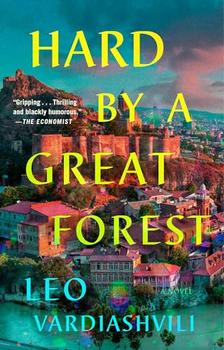Book Club Discussion Questions
In a book club? Subscribe to our Book Club Newsletter and get our best book club books of 2025!
For supplemental discussion material see our Beyond the Book article, Civil War in the Republic of Georgia and our BookBrowse Review of Hard by a Great Forest.
Please be aware that this discussion guide will contain spoilers!
- The novel Hard by a Great Forest by Leo Vardiashvili tells the gut-wrenching story of a war-torn family. Saba and his brother escaped the war in the Republic of Georgia as children. Their mother stayed behind, while their father fled with the kids to find asylum in the United Kingdom. What does the book reveal about the traumas of war? What effect does generational trauma have on Saba and his family?
- Years later, as a young adult, Saba goes back to Tbilisi, Georgia. While much of the city has changed, Saba feels at once a sense of belonging and displacement. How does Saba attempt to reconcile with his past when returning to his homeland?
- Saba searches for his father, Irakli, and his brother, Sandro, who both have vanished within weeks of their arrival in Georgia. As Saba follows a trail of clues, he unveils secrets that lead to dangerous sites and unknown people. Consider Saba's scavenger hunt as a hero's journey, in which the character embarks on a challenging adventure. What does Saba learn, and how is he transformed as a character?
- The author emphasizes the architecture that lies at the heart of Sololaki—the oldest district in Tbilisi, Georgia—filled with cobblestone streets, alleyways, and residential buildings. How does the setting (i.e., both location and time) shape or alter your reading of this story?
- As Saba explores Tbilisi, he discovers zoo animals that have broken free and are roaming around the country's capital. The scenes are based on a true story about the Tbilisi zoo in 2015. Why do you think the book uses elements of absurdism when depicting on-the-loose animals, such as "Boris the Hippopotamus"? What is the effect of juxtaposing tragedy with lighthearted comedy?
- The title, Hard by a Great Forest, echoes the first line of Hansel and Gretel, as Saba encounters a disorganized collection of riddles and mysteries. What is the impact of the novel's inclusion of whimsy, folklore, and magic? How are the fairy-tale aspects of wonder and curiosity embodied?
- Along the way, Saba befriends Nodar, who lets Saba stay over in his home with him and his wife, Ketino. Nodar and Ketino say to him, "A guest is a gift from God," a common Georgian proverb. What does this proverb demonstrate about the Georgian culture? What does it suggest about their people's values?
- Saba is haunted by the imagined voices of friends, relatives, and loved ones who died during, or after, the war. Compare and contrast the different voices of ghosts that live inside Saba's head. How is death portrayed throughout the novel?
- The book sheds light on the rubble and rebuilding of a former Soviet land, as Saba tries to flee from danger along the border between Georgia and Ossetia. How does the story illustrate tenderness, despite the ensuing chaos? What are the characters risking their lives for?
- The effects of war are immense and boundless, as shown by this novel. Where might you see parallels between this story and that of other regions in today's world? How are the consequences of war similar and/or different from one another between these regions?
- The story spans over large periods of time. How does this book help readers to think about political fighting around the world, across decades?
- The novel was inspired by real-life events experienced by the author. Vardiashvili lived in Georgia until he was twelve years old, when his family fled the fighting and economic strife in the early 1990s. English became his third language, after Georgian and Russian. How might this autobiographical context influence your understanding of the novel? How does this book, through fiction, strive to preserve and remember history?
Unless otherwise stated, this discussion guide is reprinted with the permission of Riverhead Books.
Any page references refer to a USA edition of the book, usually the trade paperback version, and may vary in other editions.
